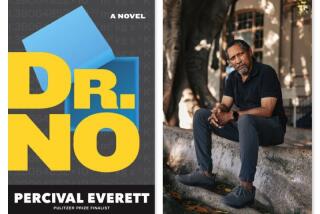COVER STORY : Dances With Sharks or the Author’s Dilemma : Should novelists adapt their books for the screen or just take the money and run?
When author Glenn Savan saw “White Palace” at a movie theater, he felt anything but pride. The film, based on his popular first novel, “made me want to throw myself into a river.”
Then there’s Avery Corman, who went numerous times to see how his book, “Kramer vs. Kramer,” had traveled from his initial creation to the big screen. “Writing a book is such an isolated, solitary act,” Corman says. “But seeing it move from one medium to the other, I watched this amazing transference of emotion.”
Talk to 10 authors, you’ll likely get 10 experiences of this eternally “uneasy alliance,” as Corman calls it, between book and movie, author and Hollywood.
More often, the two are opposed rather than allied. There are those who feel, as producer Mark Rosenberg does, that “the novelist has already peaked with a story in the writing of a book.” And authors like Susan Isaacs, who scoffs at the prejudice against novelists writing their own screenplays. “Most of us have strong plot lines and write good dialogue,” she says.
Some authors, including Savan and Tom Wolfe, choose to simply sell for delicious sums of money and stay out of the movie process. Wolfe was criticized last year by director Spike Lee for “taking the money and running” rather than caring how “The Bonfire of the Vanities” came out on screen.
Wolfe explained that, like many writers, after he’s dedicating so much time to a book, he’s ready to move on. And there’s the reluctance to turn in the joys of being a novelist. As John Irving explains, “I have a great luxury. I work on what I want. I listen to what my wife and children say. I listen to my editor. But I don’t want the advice of a mob.”
Then there are those who remain tangentially involved with a film adaptation, which can mean anything from being asked about casting, invited to lunch with the director, or being acknowledged publicly. (“They did mention me at the Academy Awards,” notes Avery Corman of the “Kramer vs. Kramer” winners. “Mostly they forget the novelist and thank their agents.”)
But it can also mean being used as an active consultant. In this category would go Oscar Hijuelos, whose “The Mambo Kings Sing Songs Of Love” is currently being made into a Warner Bros. film. Hijuelos did not write the script, but producer-director Arnold Glimcher has not only frequently asked for advice and assistance, he wouldn’t even buy the book until Hijuelos signed off on proposed changes.
But surprisingly, the authors who adapt their own books are very rare. Although last year’s two most successful film adaptations, “Dances With Wolves” and “GoodFellas,” were largely done by the authors, there remains a prejudice in Hollywood to allowing authors to adapt their own works.
Rosenberg, who produced “White Palace” and “Presumed Innocent” and has just bought A. S. Byatt’s “Possession,” says “it’s rare to find authors who understand that film is a completely different art form. It’s not a celluloid version of their book. They have to be willing to not be boss of their own material.”
Glenn Savan certainly felt the not-so-subtle prejudice: “I was invited not to write my own screenplay,” he says, “even though I think my book read more like a movie than the final movie.”
“I was sort of told, ‘Of course you’re not interested in writing the script,’ ” adds Scott Turow, whose “Presumed Innocent” was made into a movie last year. Also a first-time novelist then slightly dazzled by Hollywood, Turow has since gotten tougher and plans a more active role next time around.
And there are those few authors who don’t want to even risk having their creation tampered with. They simply refuse to sell, regardless of the money. Says author Ira Levin, who falls into the sell-but-let-them-do-it category: “I have this frightening thought that maybe the reason ‘The Catcher in the Rye’ is still read is that it was never made into a movie.”
The fruits of the book-movie connection aren’t just up there on screen. A wildly successful movie, like “The Silence of the Lambs” or “Dances With Wolves,” can revive interest in a book. (If you doubt this, look at the paperback bestseller list.) But a horrible movie could dim interest in a book, although it probably won’t do irreparable damage.
How do some of today’s top authors--none of whom live in or near Hollywood--assess their own movie experiences?
Ira Levin prefers to remain completely distanced. But he admits that with his current bestseller, “Sliver,” he is wavering for the first time.
“I don’t know if I have the moral fiber not to try to do the screenplay for ‘Sliver’ or not to sell it,” the New York writer says. “This time I just feel I owe it to the book so I might ask to be part of the package.”
Levin has watched four of his books (and four of his plays, including “Deathtrap”) turned into movies by others. “I always felt it was better to go on rather than repeat,” he says echoing Wolfe and others, “and I’ve regretted it a few times.”
Those times include “The Stepford Wives” and “The Boys From Brazil.” “They came out like movies where everyone had their finger in the pie,” says Levin, who admits that even with the best adaptation of one of his books, “Rosemary’s Baby,” “I kept seeing things that weren’t there.”
Still, he admits he was very lucky with “Rosemary’s Baby,” and is partly facetious when he says he thinks it was because the film was Roman Polanski’s first American movie. “I don’t think he knew he had the right to make changes.”
“Sliver,” as with other Levin novels, reads cinematically, dealing with a video peeping Tom who snoops into the apartments in a Manhattan building. “I just think it is too easy for someone else to do wrong on this one,” claims the author. “On the other hand, I’ve already done two full versions of it and I may be too close to it.”
Glenn Savan says he’s still “thrilled” about having a movie made of “White Palace” but concedes he was disappointed and hurt by the final product. “I worked very hard for two years to keep my characters very particular because they could so easily fall into stereotypes. Which is exactly what happened in the movie.”
In the book, the character of Nora was filled with flaws. “If a reader ended up liking Nora,” he explains, “they had to work at it. The point was you could love her anyway. But the movie turned her into a working-class heroine. There was nothing incompetent about her except she was a slob. Who’s going to be embarrassed about bringing Susan Sarandon home?”
Savan further criticizes how his male character (Max, played by James Spader) was realized--or unrealized. “He wasn’t even there.” All scenes from the character’s professional life, which helped fill him out, were excised.
The largest group of authors is made up of those who have consistently sold their books to Hollywood and have had some experience in dabbling in their screen versions. Most have been unsuccessful in the changeover and then seem willing to stay away from the process.
Here are such authors as Elmore Leonard, John Irving, Larry McMurtry, Susan Isaacs and Avery Corman. Leonard has attempted adapting some of his own dialogue-heavy mysteries and Westerns but the few that were made were generally taken over by screenwriters.
“Then there was ‘52-Pickup,’ ” says Leonard from his Florida home, “where director John Frankenheimer sent it to me and said, ‘Look, we’re taking so much out of the book, why not add a scene here or there and we’ll give you a credit?’ I guess they at least felt guilty.”
Leonard admits that before his books became so popular, he cared a lot more about the Hollywood connection. “I’ve always seen my books as movies. In the beginning, I was writing with movies in mind. I figured if I’m going to make any money, I’d better sell it there.”
With the exception of “Hombre” and “Valdez Is Coming,” Leonard says none of his books have traveled well to moviedom. “When you’re bringing 300 pages way down, you’re basically down to plot and that’s not where my books are strongest,” he says. “I like to move my stories with dialogue; there’s a lot of telling in the exposition. If you’re just looking for action and a plot, with me you’re usually down to a very pedestrian story idea. That can mean adding all this excessive nudity and violence as they did with ‘52-Pickup.’ ”
On his next book, he’s trying some preventive tactics, at least in casting. In “Maximum Bob,” a main character is a judge whom Leonard describes throughout his pages as “looking exactly like Harry Dean Stanton,” one of his favorite actors.
John Irving tried adapting his first novel, “Setting Free the Bears,” but nothing came of that. He didn’t try again until his 1985 novel “The Cider House Rules.” In between, two of his other books, “The World According to Garp” and “The Hotel New Hampshire” made their way--only fairly successfully--to the screen.
But Irving insists he doesn’t quite ever take the money and wait for the final credits. “Even if I don’t want to do the screenplay,” he says from his home in New Hampshire, “I steer the book into one director’s hands, a director who cannot be replaced and who has final control. George Roy Hill was in charge of ‘Garp,’ Tony Richardson in charge of ‘Hotel New Hampshire.’ I like their films and I never expected to see a John Irving film.”
He is interested in tackling “Cider House Rules” because of its combustible subject matter--abortion--and its potential impact.
“A popular film on that subject might have more effect than a novel. I believe most people who read the book already subscribe to a pro-choice position. With a film, maybe there’s a chance of reaching the other side,” Irving said. “I’m reasonably pleased with the script, which I believe will be in production this year. Much of the novel is lost but I have yielded to a political conviction.”
One of the country’s most popular authors, Larry McMurtry, has written only a few of the scripts from his books, including “The Last Picture Show” and the upcoming “Buffalo Girls.” He did not write the scripts for “Hud” or “Terms of Endearment,” and admits they were extremely successful adaptations.
His book “Lonesome Dove” turned into one of television’s most popular miniseries. Ironically, this was a property McMurtry first wrote as a feature script for John Wayne and Jimmy Stewart. “When all that fell apart,” he says from his home in Washington, “I went back to turn it into a book because I liked the notion of the end of the West.”
McMurtry claims he’s only interested in writing his own adaptations when the book is not of the length and breadth of “Dove,” nor has too much time lapsed between book and film. “I just find I’ve usually exhausted my interest in a story after too much time,” he says. “I am writing a script for ‘Buffalo Girls’ but it’s a book I wrote rather rapidly and I think I have enough freshness with it, I’m still alive to it emotionally.”
As critic of his own books-turned-films, McMurtry feels very lucky. “Most have been fine to watch,” he says. “I’ve written enough screenplays to know what’s involved and that it isn’t a reading experience.”
Author Susan Isaacs is eagerly awaiting “Shining Through,” the Melanie Griffith-Michael Douglas movie based on her bestseller. “I’ve been treated very courteously by the producers all along,” she says, “though I wasn’t asked to do the script and didn’t insist I do it. They’ve asked my views on casting and showed me two different versions of the script.”
She admits she was upset when she read the first draft, “but I wasn’t acting as a professional, I was reacting as a psychotic novelist.” One major change was watching the relatively minor male role get larger to suit Douglas. “I can only say I enjoyed the second draft better,” she says, “but maybe I was just getting used to it.”
Isaacs was happy with the adaptation of an earlier book, “Compromising Positions,” but says director Frank Perry had a lot to do with that. “I was working with a director of an independent film who respected writers. Novelists didn’t frighten him. And he was willing to be a mentor.”
Avery Corman has been happy with the film adaptations of his books “Kramer vs. Kramer” and “Oh God” and has also sold “50” and “Old Neighborhood,” both projects that have been making the development and option rounds for years. He may try writing the script for his newest book, “Prized Possessions,” “partially because I’d like to see this prejudice break down.”
Corman strongly feels that one reason few movies live up to their books is that screenwriters don’t have the luxury of spending years, or even months, writing them. “It’s all about time!” he says. “Authors are the ones who know these characters and how they live, but the top screenwriters who everyone goes after are so busy they rarely take that kind of care.”
Then there are those novelists who do choose to be more involved with their material once it hits the screen--and not only by writing the screenplay. “I’d be happy if someone would let me direct,” says Scott Turow, who still practices law in Chicago and who has sold his second book, “Burden of Proof,” for a television miniseries simply to ensure that more of it gets onto the screen.
“It just seemed the way to go after ‘Presumed Innocent,’ ” which he says he was mildly pleased with. He’ll have an “active consulting role” this time around. Warren Adler, who lives in Washington, Los Angeles and Jackson Hole, Wyo., now only makes deals (his “Private Lies” was sold to Hollywood for $1.2 million before it was even published) in which he gets to write the first draft of the adaptation. He’ll also be executive producer on “Private Lies.”
“I have a pet peeve,” says Adler. “I believe a novelist should be deeply involved with the script based on his book. Nowadays, with videos, the life of a movie can be as long as a book, so you should want to see your material handled well. If nothing else, I say make sure they retain your title, retain your ending and retain the integrity of your characters.”
It’s not like Adler has had terrible experiences at the box office (though he’s got a handful of optioned but unmade projects). He credits all involved with adapting his “War of the Roses.” “They had to fight hard to keep the ending, but they won. The only thing they didn’t have the guts to do was leave the dog dead.” (In the book, the animal became pate. In the movie, he lives.)
But the odds are that the novelist-as-screenwriter will remain, well, the oddity. “Every case is different,” says producer David Brown. “But one thing is true. There is a gift for writing movies and a gift for writing novels and rarely do they occupy the same brain. The art of dramatic writing is leaving out, the art of book writing is leaving in.”
Brown says Hollywood will always be interested in the novel--”Where else do you get those characters and narrative?”--and sure enough, coming soon to theaters will be projects like “Billy Bathgate,” “Remains of the Day,” “Mambo Kings” and “The Prince of Tides.” None of the scripts were written by the authors.
The uneasy alliance will surely continue. It’s probably best to take the John Irving attitude.
“I never write a piece of fiction with a film in mind. Some people read a book and say, ‘Oh wouldn’t that make a great film!’ I read a novel and I say, ‘What a great novel!’ I might add, ‘and I’m glad this author doesn’t waste his time writing films.’ ”
More to Read
Sign up for our Book Club newsletter
Get the latest news, events and more from the Los Angeles Times Book Club, and help us get L.A. reading and talking.
You may occasionally receive promotional content from the Los Angeles Times.






